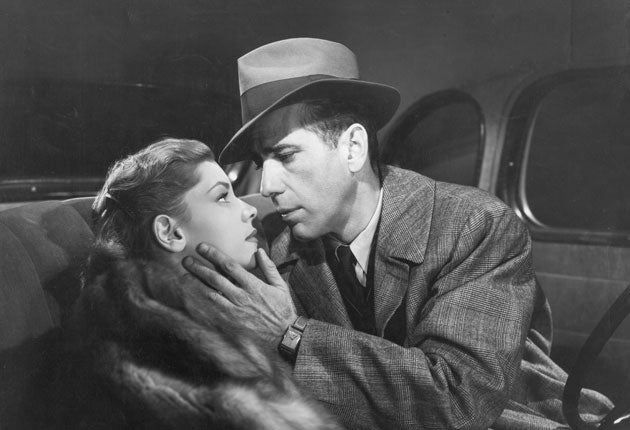The Big Sleep, Howard Hawks, 114 mins (PG)
Bogart and Bacall flirt with danger, and each other, in this re-release of a complex noir classic

Your support helps us to tell the story
From reproductive rights to climate change to Big Tech, The Independent is on the ground when the story is developing. Whether it's investigating the financials of Elon Musk's pro-Trump PAC or producing our latest documentary, 'The A Word', which shines a light on the American women fighting for reproductive rights, we know how important it is to parse out the facts from the messaging.
At such a critical moment in US history, we need reporters on the ground. Your donation allows us to keep sending journalists to speak to both sides of the story.
The Independent is trusted by Americans across the entire political spectrum. And unlike many other quality news outlets, we choose not to lock Americans out of our reporting and analysis with paywalls. We believe quality journalism should be available to everyone, paid for by those who can afford it.
Your support makes all the difference.About an hour into Howard Hawks's 1946 thriller The Big Sleep, detective Philip Marlowe (Humphrey Bogart) is paid his fee and informed that his case is closed.
Naturally, he can't let the matter drop – not with nearly half the film still to go. An unwritten rule of private-eye fiction is that the hunt is never truly on until the shamus is told that it's off. "Why did you have to go on?" Lauren Bacall's Vivian Rutledge asks Marlowe late in the proceedings. "Because too many people told me to stop," he replies.
It's when the mundane matter of payment is disposed of that a gumshoe's investigation becomes something personal, and indeed mythical – a quest. In this case, Marlowe is no longer pursuing a blackmailer, or gambling racketeers, or a circle of drug pushers and pornographers, or whoever is the supposed quarry of his investigation (the stakes are notoriously obscure, and rapidly get lost once we enter the story's labyrinth). The real object of Marlowe's pursuit becomes Vivian herself, the sexual mystery that he is out to crack by getting closer to her – so much so that the investigation increasingly becomes an excuse for Bogart and Bacall to engage in volleys of urbane, innuendo-laden repartee. Take their horse-racing dialogue. Marlowe: "You've got a touch of class but I don't know how far you can go." Vivian: "Depends who's in the saddle."
Based on Raymond Chandler's 1939 novel, The Big Sleep ostensibly recounts Marlowe's hunt for the shady characters who are making life a misery for one General Sternwood (a majestically desiccated Charles Waldron), father of two wayward daughters. "I assume they have all the usual vices," the General says of his girls, "besides the ones they've invented for themselves." The younger daughter, Carmen, seems too blissfully stoned on her own libido to invent anything new – she looks as if she's content to run through the old reliable variations. As played by Martha Vickers, Carmen is, if not the louchest, certainly the most brattish vamp in film noir. She's too much a tarnished innocent to be a femme fatale, but without a doubt she's one of the most intensely sexual presences in 1940s cinema – even if the discretions imposed by the Hays Code of censorship meant that Carmen's outré vices had to be implied, not named. At one point, she's discovered in the house of Geiger the blackmailer adjusting her stockings in front of a Buddha's head containing a hidden movie camera – a scenario of insidious strangeness in the Max Ernst league. The requirement of discretion often gives the film a surreal innocence: in the gambling den that Vivian frequents, she's found singing a jolly, faintly risqué number with the resident glee club.
The plot is famously nebulous: when asked by Hawks and his writers to explain a key point in the story, Chandler himself was at a loss. Who knows, or cares, what happened to missing man Sean Regan, or who killed the chauffeur? But the screenwriters – Leigh Brackett, Jules Furthman and novelist William Faulkner, himself no stranger to narrative dislocation – keep adding twists and impasses, ensuring that wherever the story signposts disappear, talk and mischief flourish.
Despite the equivocation, sex is more visible here than in most films of the period. That is, sex not as deadly amour fou but as verbal flirtation and jousting, often with an easy, for-the-hell-of-it recreational pay-off. Take Marlowe's encounter with a bookshop assistant (Dorothy Malone), in which a rainstorm, a bottle of whisky and a lowered blind tell us all we need to know.
The big sleep of the title may be death, but it may also be just slumber, and dream. Few thrillers are as mesmerically dream-like, with Geiger's house – the false heart of the maze, to which the story keeps returning – forever sunk in mist and mystery, like a witch's cottage in a Grimm fairytale. Cameraman Sid Hickox's wet, foggy night scenes make the film less noir than perplexingly grey and hazy, like the damp tweed of mobsters' overcoats. As the plot thickens like narcotic vapour, no one is more fascinated than Bacall's Vivian: her awkward slumped posture in Marlowe's car suggests that she's ready at any moment to subside into sleep, or into his bed. The closing title card features as overt a post-coital metaphor as any ever seen in film: two cigarettes and an ashtray. Re-released this week, and the centrepiece of BFI Southbank's Howard Hawks retrospective, The Big Sleep is as fresh and perverse as ever, and remains one of Hollywood's most entrancingly strange bedtime stories.
Next Week:
Jonathan Romney spends 127 Hours between a rock and hard place, watching Danny Boyle's true-life tale of peril
Join our commenting forum
Join thought-provoking conversations, follow other Independent readers and see their replies
Comments